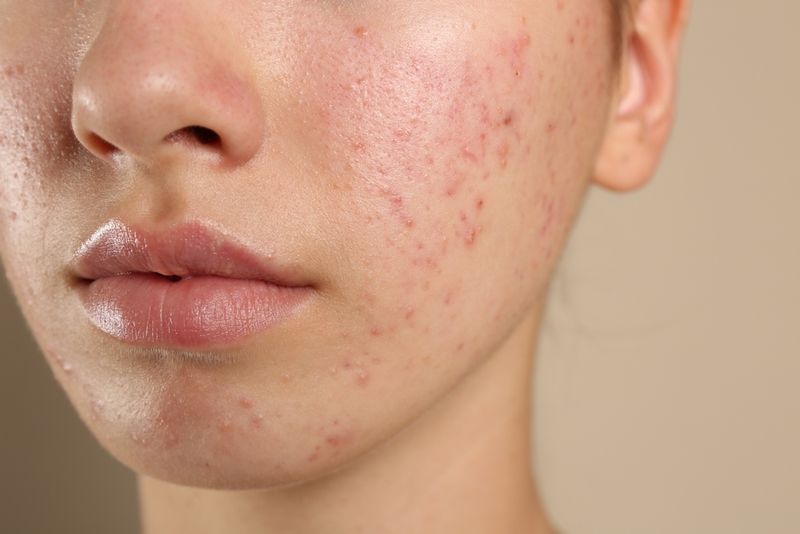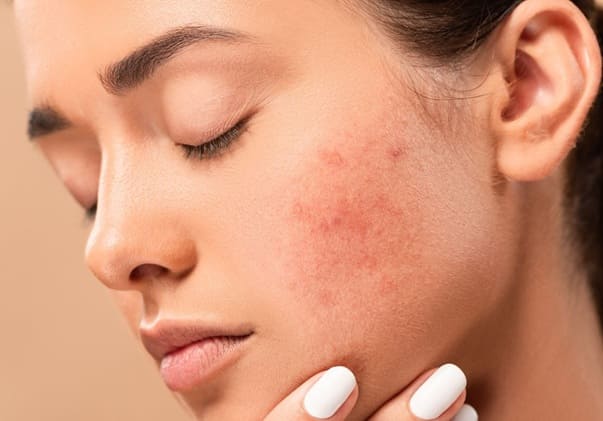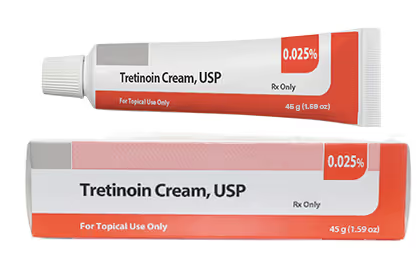Key Takeaways
- Dry skin can create an overproduction of oil, which clogs pores.
- Many factors cause dry skin, including age, climate, and skincare products.
- Use a moisturizer free of alcohol and scents to rejuvenate the skin. Go for creams instead of lotions!
If you suffer from harsh acne breakouts, you’re not alone. According to recent studies, every year, 50 million Americans suffer from mild to severe acne. Most people think of oily skin when they think of acne breakouts. Surprisingly, dry skin causes acne, too.
What role does dry skin play in our breakouts? And how do we fix it? Find out now.
How is Acne Formed?
Acne occurs when there is an issue with the sebaceous glands. These glands are responsible for secreting an essential oily substance into the hair follicle, lubricating both hair and skin to keep hair healthy, moist, and flexible.
However, these sebaceous glands can all too quickly become clogged. When this happens, pores fill up with dirt, bacteria, and other matter. This inflammation and trapped bacteria lead to the formation of large, sore pimples.
What Causes Dry Skin?
A significant cause of dry skin is extreme temperatures. If you live somewhere where the climate can drop to a cold, harsh climate, your skin will become depleted of much of its moisture. Conversely, exposure to scalding hot showers strips the skin of moisture.
But other factors dehydrate your skin. Age is a significant factor. As we age, our skin loses vital sebaceous output and moisture, increasing breakouts.
Other factors include certain medications, skin care products, and health conditions.

Dry Skin and Acne
It can feel defeating when you get breakouts despite not having greasy, oily skin. That’s because many people don’t realize that dry skin can be as insidious as oily skin when it comes to breakouts.
Your skin needs oil to function and maintain proper elasticity. When your skin becomes too dry, it kicks into overgear and produces more oil to compensate, ironically leading to clogged pores.
Dry skin also tends to have lower levels of ceramides, lipids that seal out harmful elements like bacteria and lock in moisture. Without this barrier, more bacteria can fill up pores and lead to breakouts. To add insult to injury, dry skin flakes off more dead skin cells, which further clog pores.
Acne Treatment for Dry Skin
Ultimately, the best treatment for dry skin acne is to use gentle, non-scented moisturizers.
Avoid harsh cleansers with preservatives, alcohol, acids, as these will only damage your skin’s barrier and produce more bacteria build-up, leading to more acne.
Looking for targeted, effective acne treatment? Check out Honeydew to get started!
Dry Skin Care Routine
A vetted skincare routine (that you stick to) is paramount to replenishing your skin. Use gentle formulas and cleansers that use moisture-adding elements like aloe vera.
Additionally, applying moisturizer when your skin is damp will create a potent pairing effect that further traps moisture.
You must stick to a daily routine so that your skin builds up moisture. Also, try not to introduce new products for at least a couple of weeks so you can get a read on what products are working and what ones aren’t.
A Few Habits to Avoid
Whether you suffer from chronic acne or small breakouts here and there, it’s too easy to make a misstep with acne care. Check out these tips to learn what habits to avoid so you can get your skin back on track faster than ever.
Using Products That Cause Acne
There are two types of products that cause acne: products that clog your skin with excess oil or strip your skin of too much moisture.
Avoid using products with mineral oil, lanolin, and wax as these are the front offenders that clog the skin. When it comes to moisture depletion, avoid products that use alcohol, fragrance, or preservatives.

Changing Acne Treatments Every Week
Your skin needs consistency. Otherwise, you’ll make progress and completely regress when you throw in a new product. Allow your skin and body to adjust to your new routine for three weeks before changing or swapping products.
Sleeping in Your Makeup
Sleep is essential for skin recovery, as it is during our circadian rhythms that allow skin cells to regenerate. During regeneration, hair follicles lubricate, and oil flows to your skin’s surface.
As a result, when you sleep with makeup on, you trap the oils, which plug pores and lead to more breakouts.
Scrubbing Your Skin
It can be tempting to vigorously scrub your skin to fully exfoliate and shed oil. However, doing so will deplete your skin of much-needed moisture and clog your pores with excess dry skin.
Drying Your Skin Out
Avoid activities that will over-dry your skin, like exposure to hot or cold temperatures. Also, make sure to keep hydrating throughout the day using a non-comedogenic moisturizer.
Squeezing or Popping Your Pimples
We’ve all heard it before: don’t pop or squeeze pimples. But there’s a nagging voice; can popping pimples really be that bad?
Yes, it can, and it is. Squeezing your pimples can irritate the bacteria, which recruits different cells in our body to rush to that site which leads to increased swelling and redness. Not to mention how popping can cause permanent scars.
Looking for guidance on best skin care practices? Contact Honeydew to speak to a professional today!
The Connection Between Dry Skin and Acne
There is a definite connection between dry skin and acne. If you’re suffering from breakouts but can’t figure out why, consider that your skin may be too dry. Book an appointment with a dermatologist for more information.























